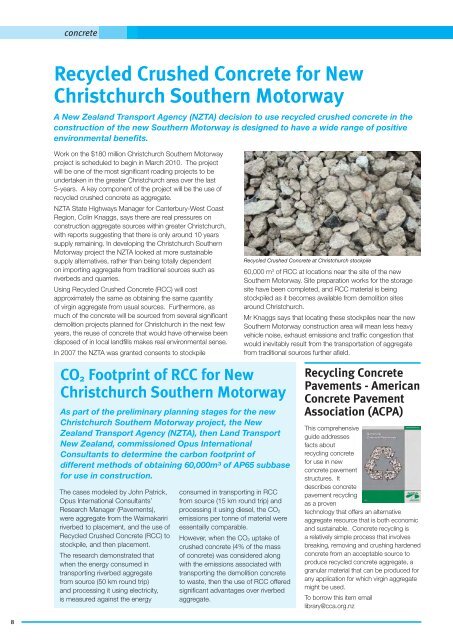Download PDF - CCANZ
Download PDF - CCANZ
Download PDF - CCANZ
You also want an ePaper? Increase the reach of your titles
YUMPU automatically turns print PDFs into web optimized ePapers that Google loves.
8<br />
concrete<br />
Recycled Crushed Concrete for New<br />
Christchurch Southern Motorway<br />
A New Zealand Transport Agency (NZTA) decision to use recycled crushed concrete in the<br />
construction of the new Southern Motorway is designed to have a wide range of positive<br />
environmental benefits.<br />
Work on the $180 million Christchurch Southern Motorway<br />
project is scheduled to begin in March 2010. The project<br />
will be one of the most significant roading projects to be<br />
undertaken in the greater Christchurch area over the last<br />
5-years. A key component of the project will be the use of<br />
recycled crushed concrete as aggregate.<br />
NZTA State Highways Manager for Canterbury-West Coast<br />
Region, Colin Knaggs, says there are real pressures on<br />
construction aggregate sources within greater Christchurch,<br />
with reports suggesting that there is only around 10 years<br />
supply remaining. In developing the Christchurch Southern<br />
Motorway project the NZTA looked at more sustainable<br />
supply alternatives, rather than being totally dependent<br />
on importing aggregate from traditional sources such as<br />
riverbeds and quarries.<br />
Using Recycled Crushed Concrete (RCC) will cost<br />
approximately the same as obtaining the same quantity<br />
of virgin aggregate from usual sources. Furthermore, as<br />
much of the concrete will be sourced from several significant<br />
demolition projects planned for Christchurch in the next few<br />
years, the reuse of concrete that would have otherwise been<br />
disposed of in local landfills makes real environmental sense.<br />
In 2007 the NZTA was granted consents to stockpile<br />
CO2 Footprint of RCC for New<br />
Christchurch Southern Motorway<br />
As part of the preliminary planning stages for the new<br />
Christchurch Southern Motorway project, the New<br />
Zealand Transport Agency (NZTA), then Land Transport<br />
New Zealand, commissioned Opus International<br />
Consultants to determine the carbon footprint of<br />
different methods of obtaining 60,000m³ of AP65 subbase<br />
for use in construction.<br />
The cases modeled by John Patrick,<br />
Opus International Consultants’<br />
Research Manager (Pavements),<br />
were aggregate from the Waimakariri<br />
riverbed to placement, and the use of<br />
Recycled Crushed Concrete (RCC) to<br />
stockpile, and then placement.<br />
The research demonstrated that<br />
when the energy consumed in<br />
transporting riverbed aggregate<br />
from source (50 km round trip)<br />
and processing it using electricity,<br />
is measured against the energy<br />
consumed in transporting in RCC<br />
from source (15 km round trip) and<br />
processing it using diesel, the CO2<br />
emissions per tonne of material were<br />
essentailly comparable.<br />
However, when the CO2 uptake of<br />
crushed concrete (4% of the mass<br />
of concrete) was considered along<br />
with the emissions associated with<br />
transporting the demolition concrete<br />
to waste, then the use of RCC offered<br />
significant advantages over riverbed<br />
aggregate.<br />
Recycled Crushed Concrete at Christchurch stockpile<br />
60,000 m3 of RCC at locations near the site of the new<br />
Southern Motorway. Site preparation works for the storage<br />
site have been completed, and RCC material is being<br />
stockpiled as it becomes available from demolition sites<br />
around Christchurch.<br />
Mr Knaggs says that locating these stockpiles near the new<br />
Southern Motorway construction area will mean less heavy<br />
vehicle noise, exhaust emissions and traffic congestion that<br />
would inevitably result from the transportation of aggregate<br />
from traditional sources further afield.<br />
Recycling Concrete<br />
Pavements - American<br />
Concrete Pavement<br />
Association (ACPA)<br />
This comprehensive<br />
guide addresses<br />
facts about<br />
recycling concrete<br />
for use in new<br />
concrete pavement<br />
structures. It<br />
describes concrete<br />
pavement recycling<br />
as a proven<br />
technology that offers an alternative<br />
aggregate resource that is both economic<br />
and sustainable. Concrete recycling is<br />
a relatively simple process that involves<br />
breaking, removing and crushing hardened<br />
concrete from an acceptable source to<br />
produce recycled concrete aggregate, a<br />
granular material that can be produced for<br />
any application for which virgin aggregate<br />
might be used.<br />
To borrow this item email<br />
library@cca.org.nz


